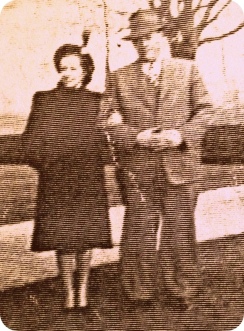
(Remembering Mary Ellen Townsend Harris, 1911-2016)
After Mary’s grandpa died in 1934, her grandma divided up the farm between the three sons. Her daddy received an eighteen acre plat that included the old house where Mary had grown up. Within two years of Hughie’s birth, Elmer and Merle built themselves a new house next to the old one. It had a panoramic view of the countryside and plenty of room for gardening. When they moved there, Elmer turned the Price Hill house into two apartments.
Mary decided she would like to live back in the Price Hill house where she had spent her teenage years. She excitedly told her friend, Mary Grace Schuman, “You wouldn’t believe the upstairs! That’s the apartment we’re going to take. You remember the two front rooms were bedrooms…well, now they’re a living room and dining room.”
“So where are the bedrooms? I can’t wait to see this.”
“Those are actually on the third floor…that’s right, we get two floors.”
“Sounds great…but I’m surprised you’re leaving the built-in babysitter you have over in Oakley.”
“That’s true….” Mary briefly mulled over this. “Still, we had good neighbors on Purcell. I always liked Mrs. Schiff when I was growing up. She still lives next door. I think she’ll love Hughie.”
“I hope so. When are you moving?”
“Soon as we can get things arranged. Hugh has changed jobs again. He’s working for Western and Southern Life. You know how hard it is to get a steady job right now.”
The depression was still hanging on. In this new job, Hugh was collecting debts on insurance policies that were in force. He was expected to sell the same clients additional insurance. As it turned out, that plan didn’t work out too well. He was soon terminated. In spite of that, Mary and Hugh went ahead with their move.
Mary had quit work at Smokeless Coal when the baby was born, and they missed her income. One day she noticed an ad in the newspaper that read, Wanted: Dressmaker’s Assistant.
That’s right up my alley, she thought. The dressmaker was in Westwood, which was twenty miles from Price Hill. The woman was looking for someone to help with alterations. Mary applied for the job and was hired.
Since dressmaker worked from her home, Mary took Hughie to work with her on the bus. He proved to be no trouble to anyone, content to play with his toy cars on the porch. The arrangement worked well. Then one day her employer said, “Mary, you can sew so well, I wonder if we might make a special arrangement?”
Mary was surprised. “What kind of arrangement?”
“Well, you don’t need me to oversee your work. Why don’t you take the clothes to be altered home with you, work on them there, then once each week you can bring them back to me? That will take some stress off of you.”
Mary agreed and soon got settled into that pattern. Even with the bus fare, she made enough to pay for groceries each week. Hugh also got a new job, so things were looking up.
When Hughie’s second birthday arrived they had a big family party for him and invited Hugh’s parents, Estus and Toy from Mowrystown. Estus had become interested in wood working, had built himself a shop adjacent to the barn, and was learning to make furniture. He built a small maple table with two chairs for Hughie and brought them to the apartment for his birthday party. Hughie loved them, but didn’t quite seem to be himself.
Late that night he ran a high fever, so the next morning they took him to the doctor. “Well,” he said after examining him, “he has an ear infection, and we can do something about that with some medicine. Now, when that clears up we will have to remove his tonsils and adenoids.”
That shook Mary up. It was her first encounter with something more than a cold affecting her child. She even developed a sympathetic condition herself. Her own ear became infected and she realized how much pain her child was experiencing. Once his ear problems had cleared up, Mary got over her ear ache, and Hughie had his tonsils removed.
Mrs. Schiff did indeed become a blessing for Mary and Hughie. She had a clothes chute upstairs than went directly to her washing machine in the basement. Hughie got a charge out of dropping clothes in there and watching them disappear. Whenever she changed bed sheets, she would call and ask if he could come over and put them down the chute.
Hughie and Mrs. Schiff developed a wonderful relationship. She had a collection of metal toy soldiers that she kept in a box. Whenever he went to her house, Hughie would get those soldiers out and play with them on the floor. She and his mom could visit and talk while he entertained himself. She also baked brown bread, which he liked. Whenever she had freshly-baked loaves she would call him over. He loved Mrs. Schiff.
She spoiled him, and so did his step-great-grandmother and her two daughters. Early in 1940 Mary discovered she was pregnant. She and Hugh found a larger apartment across town on Halpin Avenue in the Mount Lookout section of the city. Hugh’s grandfather, Adolphus, had built a number of homes over the years, and one of them had a first floor apartment that was available. Mary and Hugh moved there in September, and Mary’s second child, a daughter, was born in December.
Merle Toy Harris, nicknamed “Sissy,” brought joy mingled with new challenges to Mary and Hugh. Listening to her heartbeat the doctor noticed something unusual. Mary watched him as he checked again with his stethoscope.
“Is everything okay?” she asked.
The doctor turned toward her. “I don’t want to alarm you, but I’m hearing something in your daughter’s heartbeat that I need to consider carefully. It isn’t unusual for small children to have this, and usually it clears up with a little time. I’m hearing what we call a heart murmur. It means the blood is rushing through her heart too quickly.”
Mary caught her breath, alarmed. “Did you say a heart murmur?”
“Yes…”
“That sounds terrible. What can we do about it?”
“It might not mean a thing. As I said, this is not unusual in small children, and they normally outgrow it rather quickly. At this point we just need to observe her–and I will consult another doctor to look over my shoulder. If she doesn’t outgrow it, you’ll need to protect her from undue stress. She’ll be vulnerable to bronchitis, pneumonia and even heart failure.”
That was a blow to Mary and Hugh. This was a harsh reality they had to come to grips with. Mary’s exposure to her father’s meditative Quaker faith helped her do that. She pondered Sissy’s condition and prayed about it. She sought assurance that God was with her and her daughter in this situation. Prayer and faith emerged as her way of coping and going forward.
As time went on, Mary found Sissy was slow in doing things that other children did more quickly…and she slept a lot. Hughie was excited to have a little sister and wanted to play with her. Mary taught him to treat her gently. At the same time, Sissy developed a contrary attitude that made everything an even greater challenge.
Mary adjusted and normalized her situation as much as possible. Then, just twenty days before Sissy’s first birthday, it felt to her like the whole world got turned upside down. On December 7, 1941, Japan attacked Pearl Harbor and the United States entered World War Two. It seemed that life was now an endless stream of unexpected challenges, choices and adjustments.
In her spirit, Mary trusted God, and knew that with his help she could cope with whatever happened. She also knew nothing would ever again be the same as it had been.
(Excerpt from “Dairyman’s Daughter” by Hugh Townsend Harris, based on “Remembering!” by Mary Ellen Townsend Harris)


It’s so inpteresting to read this as an unfolding story, to be “in the moment”. By the time NanNan shared the stories with me they were reflections of events and circumstances she had already learned to take in stride.
LikeLike
Reblogged this on dinkelislandsmalltalk.
LikeLike